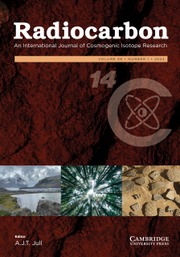Article contents
Radiocarbon Chronology for Prehistoric Complexes of the Russian Far East: 15 Years Later
Published online by Cambridge University Press: 18 July 2016
Abstract
The recent progress in radiocarbon dating of the prehistoric cultural complexes in the Russian Far East is discussed against the background of ancient chronologies for greater East Asia. Since 1997, the wide use of accelerator mass spectrometry (AMS) radiocarbon dating along with the continuation of conventional dating has allowed us to establish the age of several key Paleolithic, Neolithic, and Paleometal sites. It has also contributed to advancing a deeper understanding of the timing for the beginning of pottery production, maritime adaptation, and agriculture, and several other important issues in prehistoric chronology for the studied region. Reservoir age correction values for the Japan and Okhotsk seas are now used to adjust the age for samples of marine origin. Some of the cultural-chronological models for prehistoric far eastern Russian complexes put forward in the last 10 yr lack a solid basis, and are critically evaluated herein.
- Type
- Articles
- Information
- Copyright
- Copyright © 2012 by the Arizona Board of Regents on behalf of the University of Arizona
References
- 3
- Cited by


